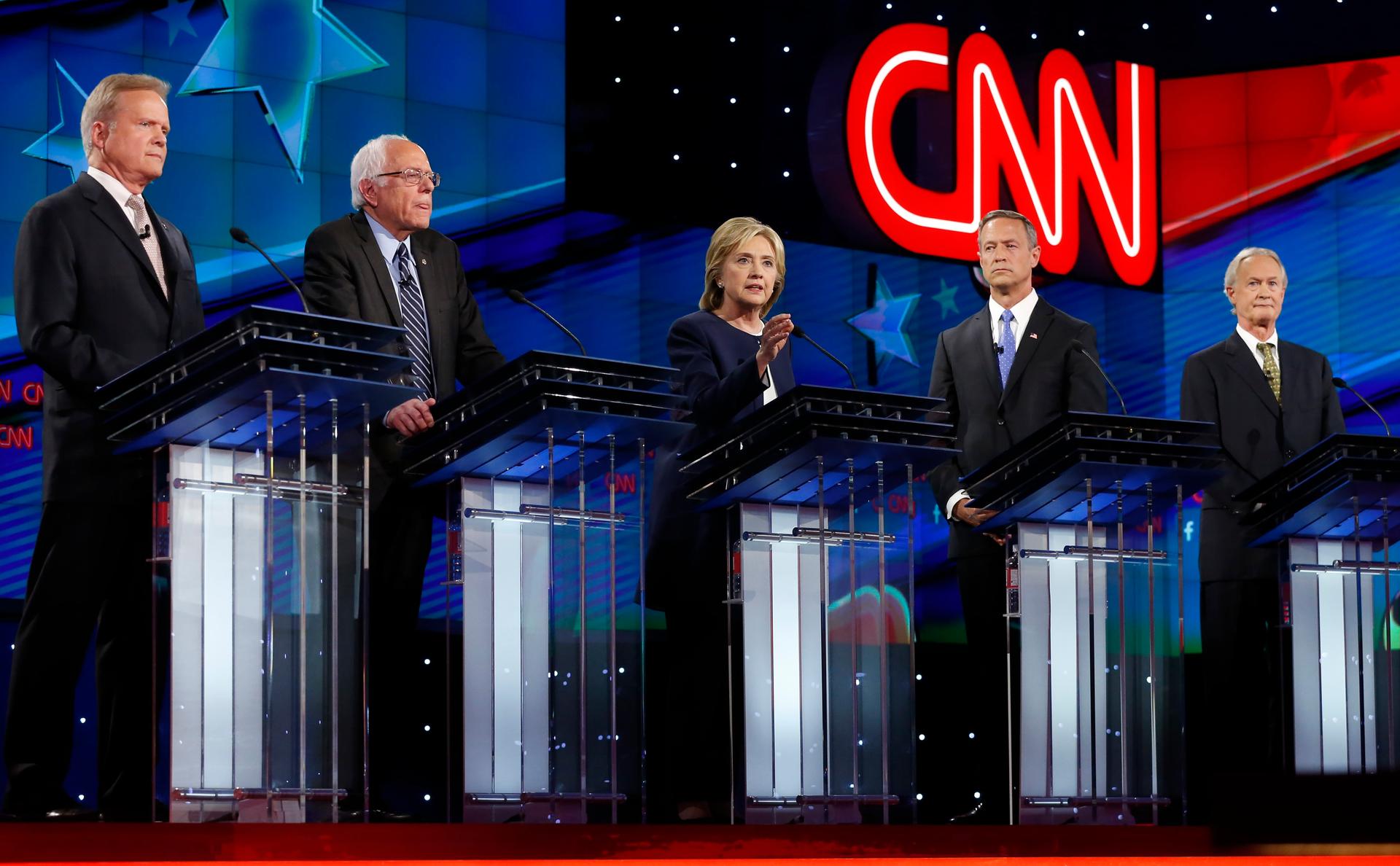What is America’s greatest threat? For many, the answer is climate change.
Jim Webb, Bernie Sanders, Hillary Clinton, Martin O'Malley and Lincoln Chafee attend the first debate in Las Vegas, Nevada October 13, 2015.
Five candidates at last night’s Democratic presidential debate, four different answers.
It’s the chaos in the Middle East, said former senator and Rhode Island governor Lincoln Chafee. "There's no doubt about it."
Former Virginia senator Jim Webb and former Maryland governor Martin O'Malley both pointed to the threat of a nuclear Iran. For former secretary of state Hillary Clinton, it was nuclear proliferation in general.
And for Vermont senator Bernie Sanders, climate change. Yup, climate change.
To Politico editor Susan Glasser, Clinton's answer was the most striking. "It was something that you could imagine Dick Cheney saying almost verbatim," Glasser says.
Clinton's choice to focus on nuclear proliferation was interesting, she says, because of her insider’s view as president Obama’s chief diplomat, who’s had to deal with all these threats and others first hand.
"Other than that, it's a pretty standard list of horrors," Glasser says.
Except for Sanders’. His choice of climate change as the No. 1 threat is probably not top of most Americans' list of national security threats. "The scientific community is telling us that if we do not address the global crisis of climate change, transform our energy system away from fossil fuel to sustainable energy, the planet that we're going to be leaving our kids and our grandchildren may well not be habitable," Sanders said. "That is a major crisis."
Still Glasser says the assertion is well in line with Sander’s position on the left of the party.
"I think that he was addressing more or less the liberal talking point that speaks directly to the core of supporters who have cheered his candidacy on in the past few months. I think that's what they wanted to hear from him, and that's what he gave them," she says.
But climate change as a foreign policy issue and even a major threat was hardly relegated to the fringes of the Democrats’ debate. All but one of the candidates mentioned it as part of their opening statements and took fairly aggressive stances on the issue—Senator Webb was the sole exception—and Chafee even said the enemy he was proudest of was the coal lobby.
"For better or worse, this is an issue that the Democrats are going to own,” says The World's environment editor Peter Thomson.
“If you believe that climate change is a real problem, if you believe that climate change is among the most important problems, you’re probably going to vote Democrat no matter who gets the nomination," Thomson says.
Several of the candidates pointed fingers at China and India as the countries with which the US needs to be most aggressive in pushing for global progress on climate. China is the biggest current CO2 emitter, although the US is responsible for the biggest share historically. Webb singled out the two as dragging their feet on climate, and Clinton pointed out the Obama administration’s pivotal role in wrangling an agreement with China at the 2009 UN climate summit in Copenhagen.
For his part, Sanders said the US needs to be "extremely aggresive" and even invoked the Pope, saying climate change is a moral issue.
Whether you view climate change as a moral issue or a national security concern, Thomson says it underlies many of the challenges facing the US abroad.
"Climate change lurks underneath lots and lots of volatile situations all around the world," Thomson says. "In the middle east we’ve seen it impact on food shortages because of drought and other things. We have migration that is happening all around the world, in many places because of environmental changes that are due in part to climate change."
During last night's debate, we heard the answers of five American presidential contenders to the question.
If you were in their shoes, how would you have responded? What do you see as the greatest national security threat? Is that even an important question to ask? Let us know your thoughts by leaving a comment below or at our Facebook page.
The story you just read is accessible and free to all because thousands of listeners and readers contribute to our nonprofit newsroom. We go deep to bring you the human-centered international reporting that you know you can trust. To do this work and to do it well, we rely on the support of our listeners. If you appreciated our coverage this year, if there was a story that made you pause or a song that moved you, would you consider making a gift to sustain our work through 2024 and beyond?
